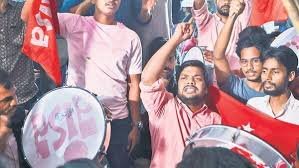In a resounding demonstration of student activism and political engagement, the Jawaharlal Nehru University (JNU) witnessed a decisive victory for left-leaning ideologies in the recent student union elections.
The United Left alliance, comprising various progressive student organizations, triumphed by securing three out of four central panel positions, with the Birsa Ambedkar Phule Students’ Association (BAPSA) clinching one post. The results not only underscored the campus’s enduring commitment to social justice but also highlighted the importance of diverse representation and advocacy within academic institutions.
Led by Dhananjay of the All India Students’ Association (AISA), the United Left alliance marked a significant milestone by electing the first Dalit president in two decades. Dhananjay’s victory resonated with students, signaling a demand for inclusive leadership and a departure from traditional power structures. In his acceptance speech, Dhananjay pledged to champion the rights of marginalized communities, advocate for better infrastructure, and combat discriminatory practices within the university.
Furthermore, Priyanshi Arya’s win as the general secretary, representing BAPSA, reinforced the importance of intersectionality and inclusivity in student governance. Arya, a Dalit queer woman, articulated her commitment to addressing issues of accessibility, dropout rates among marginalized students, and gender sensitization. Her victory not only symbolized progress but also highlighted the necessity of amplifying marginalized voices in decision-making processes.
Avijit Ghosh’s election as vice president and Mo Sajid’s appointment as joint secretary further solidified the Left’s dominance in the student union. Both candidates vowed to prioritize student welfare, advocate for improved hostel facilities, and address gender disparities in academic enrollment.
Despite facing challenges, including the disqualification of a candidate on the eve of the elections, the Left coalition showcased resilience and solidarity. Swati Singh’s disqualification prompted a strategic alliance between the Left and BAPSA, demonstrating a collaborative approach to advancing shared goals of social justice and equity.
JNUSU high voter turnout
The JNU campus, renowned for its vibrant intellectual discourse and cultural diversity, served as a fertile ground for the Left’s progressive agenda. Through open debates and grassroots mobilization, students actively engaged in shaping the trajectory of their university’s governance. The elections not only reflected the democratic ethos of JNU but also reaffirmed its status as a bastion of progressive activism.
Moreover, JNU’s legacy of advocacy for social justice has reverberated beyond campus borders, influencing national discourse on issues ranging from reservation policies to fee hikes. The university’s commitment to pluralism and inclusivity has challenged dominant narratives, offering an alternative vision for a more equitable society.
As the dust settles on the election fervor, the mandate for the newly elected student representatives is clear: prioritize the voices of the marginalized, advocate for systemic reforms, and uphold the values of social justice and diversity. The historic victory of the Left in JNU serves as a beacon of hope and inspiration for student movements across the country, reaffirming the transformative power of collective action and progressive politics.












